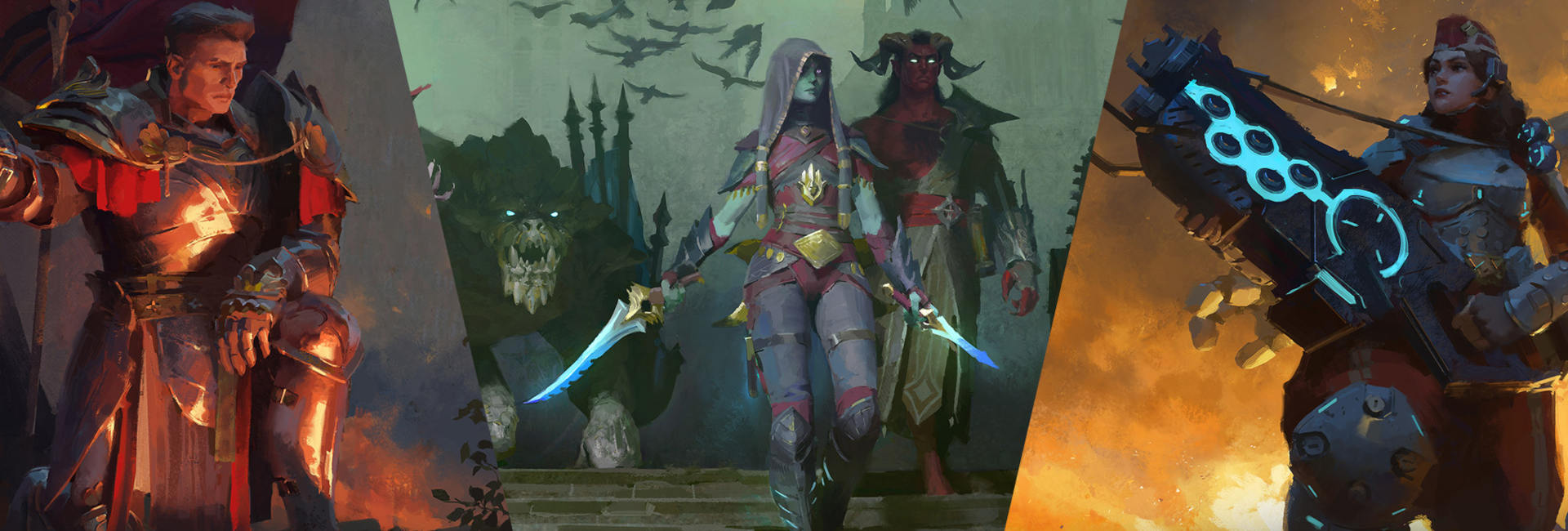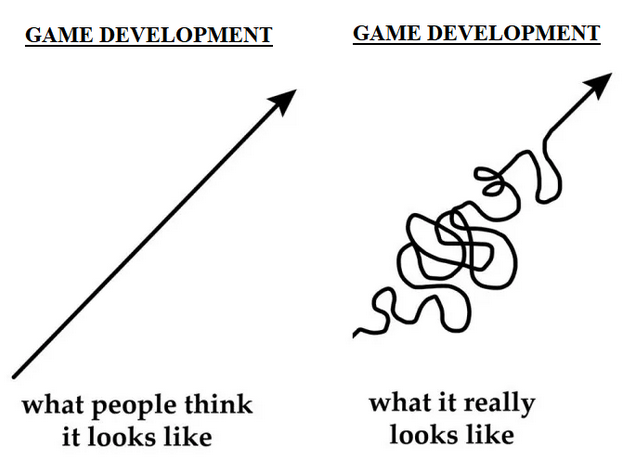This Is Spellcraft!
CATEGORY
Dev Blog
DATE
10 March 2023
AUTHOR
The Spellcraft Team
READ TIME
5 mins

Hello, gamers! We’re One More Game, and this is our first game: Spellcraft.
Spellcraft is a new type of strategy game: a Real-Time Battler where you actively command an entire team of heroes and cast spells to outplay your opponents. Heck yeah! Blog post complete! Go click the playtest button on Steam and play in the Open Alpha!
But, while you’re downloading, we’d love to tell you a little bit about how we made this thing.
We chose our studio’s name as an aspiration: we want to make things that get players to say, “Alright, just one more game!” In other words, we want to make games players love.
Our team’s been lucky enough to work on a bunch of well-loved games over our collected careers. One of our founders, Pat, led development on some other games with “Craft” in the name, like, y’know, Warcraft and StarCraft (plus he cofounded ArenaNet for you enlightened Guild Wars heads). The team’s worked on a bunch of other games, too, like League of Legends, Magic: the Gathering, Pokémon, Diablo, et cetera.
We’re thrilled (and anxious!) to see how players react to Spellcraft. Here’s a little bit of background about how we came up with the game:
Genre Bending
We knew that more than anything else, we wanted to build something new.
Not a “better version” of some established genre. Not yet another open-world action game with some big IP attached to it. We weren’t interested in chasing the latest trends, be they crypto, web3, the metaverse, or AI. We just* wanted to make a genuinely novel game that we hope players will want to play over and over again.
*lol
Early on, we thought about how our favorite online gaming experiences made us feel, and what would need to be true about our first game to capture some of that same energy.
We agreed on a few goals for our debut: it would be a multiplayer, competitive game. We wanted to balance an incredibly high skill ceiling with approachability for new players: as much love as we have for StarCraft, we wanted to make a game that doesn’t require superhuman APM to even compete.
We also decided we wanted to make a game that could theoretically be played – and played well! – on any gaming device*: PC, consoles, handhelds, (don’t you guys have) phones, VR/AR, Some Weird Device Elon Musk Wants to Implant in our Brains, etc.
*But we’re on PC only for now.
For a long time, when we talked about Spellcraft in private, we’d describe it half-jokingly as “real time, and strategic, but not real-time strategy.” Being in command of an entire army while a battle takes place in real-time is a unique sensation. But RTSes can be overwhelming and demand a lot of tedious micromanagement that many players don’t love.
We wanted to zoom in on the action while still making you feel like you were in control of a real-time battle. What if you were in command of an entire team in an MMO arena match – or a MOBA teamfight?
Alpha-Driven Development
The hard thing about making something unprecedented and undefined is there’s no map or how-to guide. Finding the fun in a brand-new genre is one part modern art, one part mad science experiment. It requires both overwhelming hubris (“why yes, of course we can invent a new type of video game”) and selfless humility (“why yes, that brilliant design idea we were 110% confident in last week turned out to be a big ole stinker”).

Our approach to navigating the part of the map that says “here be dragons” is something we call Alpha-Driven Development. Basically, that means we move fast, we involve external players early, and we focus on the core of what makes a game fun (over the polish and content).
We’ve been testing Spellcraft with external players almost every week since Halloween night in 2020. Having external players helps with the hubris and the humility: when real-live players tell us something we made is really fun, it confirms that we’re onto something – and it’s a morale-boosting shot of confidence for the team. On the flip side, external players have a perspective that’s free from the bias of, you know, being paid to work on a video game, and not infrequently players will tell us when something sucks for reasons that are hard to see when you’re close to it.
If you’re truly gamedev-pilled, and you want to read more, we’ve got a whole series of blog posts on our CORPORATE WEBSITE about how we think about makin’ games.
Opening Up
Until now, we’ve run two “larger” alpha tests with a few thousand players. Both alphas gave us confidence to believe we’re onto something with Spellcraft – and they also gave us plenty of feedback to ruminate as we steer the game towards something players might love.
Those alpha tests were confidential. We didn’t let anyone stream the game. We didn’t show any footage of the game in action. We didn’t even talk about what made Spellcraft’s gameplay unique. So while we learned a ton from those tests, we really don’t know how the game’s going to land with players once we really put it out there.
This alpha’s different. It’s a public playtest. Press one button on Steam and you’re in (unless we’re too popular for our own good)! We’re past being protective about what we’re making – it’s time to put it out there and see what the gaming public has to say. We’re working with content creators (BTW, if you make content, you should sign up for our creator program), and we’re putting Spellcraft in front of the media for the first time.
So, this is Spellcraft. It’s a real-time battler. Pick your heroes, place ‘em on the battlefield, and then you’re in charge. Nuke your opponent’s squishies, yeet your own dudes to safety, and devise your meta-crushing* strat to climb the alpha ranked ladder.
*Yeah, we’re pretty sure there will be an established meta by day 2 of the playtest – such is live game development. We’ll have some nerfs and buffs out soon to shake things up, don’t worry!
It’s an exciting moment for us. We hope you check out Spellcraft and agree that it’s something special. And we hope that you’ll tell us what you think, one way or the other.
